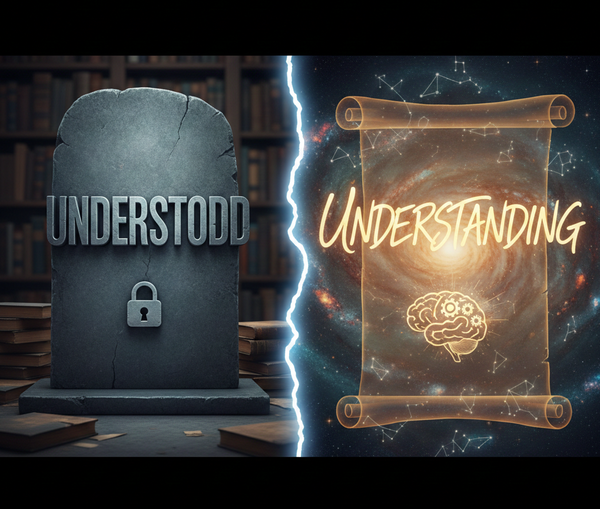I Am Cold vs. I Have Cold: A Philosophy in Two Words

There's a curious linguistic asymmetry that might explain one of the deepest divides in Western philosophy. It hides in plain sight, in something as simple as how we talk about feeling cold.
The Cold Divide
In English, we say: "I am cold."
In Italian and French, they say: "I have cold" (Ho freddo, J'ai froid).
This isn't just a quirk of translation. It's a fundamentally different way of construing experience. English treats coldness as a property or state of the person—you are cold in the same way a table might be cold. Romance languages treat coldness as something you possess or experience—an entity distinct from you, the experiencer.
The pattern extends across bodily sensations with Germanic languages:
- Hunger: "I am hungry" vs. "Ho fame, Ich habe Hunger" (I have hunger)
- Thirst: "I am thirsty" vs. "J'ai soif, Ich habe Durst" (I have thirst)
But the divergence goes even deeper, touching fundamental aspects of identity and existence itself.
Consider age and time: In English, we say "I am 30 years old"—age is a property you are. In Italian, "Quanti anni ho?" (How many years do I have?)—age is something you possess, years you've accumulated.
Or take one's name and identity: In English, "What is your name?" "I'm Howard"—your name is what you are, an essential property of your being. In Italian and German, "Come ti chiami?, Wie heißt du?" (How do you call yourself?) "Mi chiamo Howard", "Ich heiße Howard" (I call myself Howard)—your name is something you do, an action of self-designation, not a fixed essence.
Of course there are exceptions but these aren't superficial differences. They reveal contrasting orientations toward identity itself: English treats identity as static being, Continental languages treat it as something possessed, accumulated, or actively performed.
From Grammar to Philosophy
Now consider the great philosophical divide that has shaped modern thought:
The Anglo-American Tradition:
- British Empiricism (Locke, Hume, Berkeley)
- Logical Positivism (Russell, Ayer)
- Contemporary Analytic Philosophy
- Scientific Naturalism
The Continental Tradition:
- German Idealism (Kant, Hegel)
- French Rationalism (Descartes)
- Phenomenology (Husserl, Heidegger, Merleau-Ponty)
- Existentialism
The geographical split mirrors the linguistic one almost perfectly.
The Quality of Introspection
Here's the subtle but crucial point: it's not that English speakers can't introspect. The British Empiricists were masters of introspection—Locke carefully examined the contents of his mind, Hume analyzed his impressions and ideas with meticulous attention.
But the quality of that introspection differs.
When your language habitually says "I am cold," you're primed to think of mental states as properties of the self. Introspection becomes examining yourself as an object, cataloguing mental states like a naturalist cataloguing specimens. The subject-object split extends even into self-examination. You become both observer and observed, but the framework remains fundamentally objectifying.
When your language says "I have cold," there's a persistent grammatical reminder: the experiencing "I" is distinct from what it experiences. The subject remains a subject—a locus of experience that can't fully collapse into its objects. Introspection becomes exploring the structure of how a subject relates to its experiences, not just listing mental contents.
Why Continentals Critique Science
This linguistic difference might explain why the Continental tradition has been so consistently critical of the scientific worldview, while the Anglo-American tradition embraces it.
The Continental Critique:
- Science's "view from nowhere" is actually a view from somewhere that conceals its own perspective
- Objectification eliminates the experiencing subject, which is the very condition for there being a world at all
- The subject-object split is an artificial abstraction that distorts primordial, lived experience
- Science cannot account for its own foundations in the "life-world"
The Anglo-American Embrace:
- Science is the gold standard for knowledge
- Objective methods successfully eliminate subjective bias
- Consciousness itself can (in principle) be fully explained scientifically
- Philosophy should model itself on science
If you speak a language where you "have" experiences, it feels natural that:
- The experiencing subject is irreducible
- Something essential is lost in pure objectification
- A third-person scientific account is inherently limited
If you speak a language where you "are" your states, it feels natural that:
- Mental states are properties like any other
- The subject is itself available for objective study
- A complete scientific account is possible in principle
The Paradox of English Empiricism
There's an irony here. The British Empiricists started with the most radically subjective claim imaginable: all knowledge comes from experience, from what appears in consciousness. Yet their linguistic framework led them to treat even this inner experience as a collection of objects—ideas, impressions, sense-data—to be catalogued and analyzed from a quasi-external standpoint.
Continental phenomenology, by contrast, insists that consciousness is not just another object in the world but the opening through which a world appears at all. The experiencing subject can never fully objectify itself because it is the condition of objectification.
The Chicken or the Egg?
Does language shape culture, or does culture determine language? This is a bit like asking whether the chicken or the egg came first—probably not a very useful distinction. Language and culture co-evolve, mutually reinforcing each other in complex feedback loops.
The point isn't to establish a simple cause-and-effect relationship, but to notice the deep coherence between linguistic patterns and philosophical traditions. Whether language causes worldview or reflects it, the correlation itself reveals something important about how thought and expression intertwine.
This isn't linguistic determinism—the idea that language rigidly constrains what we can think. Clearly, English-speaking philosophers can grasp phenomenology, and Continental thinkers can do rigorous science.
But language might work more like a grooved path than a prison. It makes certain moves feel obvious, natural, intuitive, while others require deliberate effort and feel somewhat alien. It shapes what counts as a good starting point, what needs explanation and what can be taken as given.
The grammar we speak every day, thousands of times, might quietly incline us toward certain philosophical postures—not by making others impossible, but by making them feel less like home.
Conclusion
Next time you say "I am cold," pause for a moment. That simple grammatical construction carries within it an entire worldview—one that sees persons as bearers of properties, that makes objectification feel natural, that enables the "view from nowhere" of modern science.
And if you speak Italian, French, or German, next time you say "Ho freddo," recognize that you're affirming something profound: you are not identical to what you experience. The "I" that has coldness is something other than the coldness it has. The subject persists as subject, irreducible to its objects.
Geneosophy's worldview might be more palatable to a "Continental" speaker than an Anglo-American one. That does not mean that Anglo-Saxons won't be able to make Geneosophy their own. It just means that they will have to put in a little more effort.
In the end, perhaps the great philosophical divide between Anglo-American and Continental thought isn't primarily about arguments or evidence. It's about what feels like an obvious starting point versus what needs justification—a difference that begins in the grammar of everyday life, long before we ever open a philosophy book.




